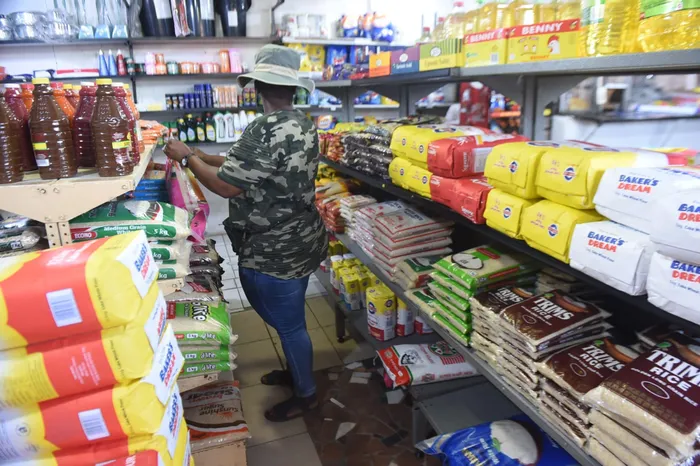Why SAHRC flagged Operation Dudula to Hawks over June 16 plans
Anti-immigration agenda

Members of the Operation Dudula Movement led yet another operation of shutting down spaza shops owned by illegal foreigners in Diepkloof. The operation uncovered expired food items which included cookies, snacks, colddrinks, painkillers and sanitary pads.
Image: Picture: Itumeleng English Indep[endent Newspapers
The South African Human Rights Commission (SAHRC) has raised the alarm over Operation Dudula’s latest planned activities in Rosettenville, Johannesburg, and has reported the group to the National Police Commissioner, General Fannie Masemola, and the Hawks.
This follows social media posts by Operation Dudula, in which the group called on members of the public to join them on 16 June to “reclaim hijacked properties from illegal foreigners.” The post, shared on the group’s Facebook page, claims that a Nigerian national has taken control of over 100 properties and alleges, without evidence, that several white South Africans have been murdered in the process.
The planned gathering is expected to start at 9 am at the Moffettview police station. It forms part of the group’s ongoing efforts to mobilise communities around their anti-immigration agenda — a campaign critics say fuels xenophobia and undermines the rule of law.
In response, the SAHRC said on Sunday that it had taken note of the concerning language and potential for incitement. “We have already alerted the National Commissioner of Police and will keep these calls under close watch,” the Commission stated.
“We reserve the right to pursue charges under the Cybercrimes Act 19 of 2020 should the content amount to criminal incitement.”While acknowledging that communities often face real concerns about crime and service delivery, the Commission urged citizens not to take the law into their own hands.
“Freedom of expression does not extend to speech that incites hatred or violence,” it added. The Commission encouraged South Africans to report criminal activity to SAPS or relevant authorities and to consult its Social Media Charter for responsible online engagement.
“Together with law enforcement and civil society, the SAHRC will continue to safeguard the dignity, equality and security of every person in South Africa.”In response to the SAHRC, Operation Dudula denied being a violent organisation. “We are peaceful,” the group said in a statement. “We just want to help illegal foreigners return to their home countries. We are good Samaritans.”
However, Operation Dudula’s activities are under increasing legal scrutiny. Last week, the High Court in Johannesburg heard arguments from civil society groups including Kopanang Africa Against Xenophobia (KAAX), the South African Informal Traders Forum (SAITF), Inner City Federation (ICF), and Abahlali baseMjondolo.
The applicants argue that the group’s actions constitute xenophobic harassment, intimidation, and unlawful evictions.
According to legal counsel Jason Brickhill, Operation Dudula has been forcibly shutting down informal businesses, demanding identity documents, and even removing learners and teachers from schools based on nationality.
The applicants also challenged Section 41 of the Immigration Act, arguing that its current form allows warrantless searches beyond public spaces and does not require reasonable suspicion before demanding immigration status.
As tensions rise ahead of 16 June, the SAHRC and the Hawks have pledged to monitor the situation closely.
The case against Operation Dudula highlights broader concerns around rising anti-immigrant sentiment and the erosion of constitutional protections for vulnerable communities in South Africa.

Members of the Operation Dudula Movement led yet another operation of shutting down spaza shops owned by illegal foreigners in Diepkloof. The operation uncovered expired food items which included cookies, snacks, colddrinks, painkillers and sanitary pads.
Image: Picture: Itumeleng English Indep[endent Newspapers